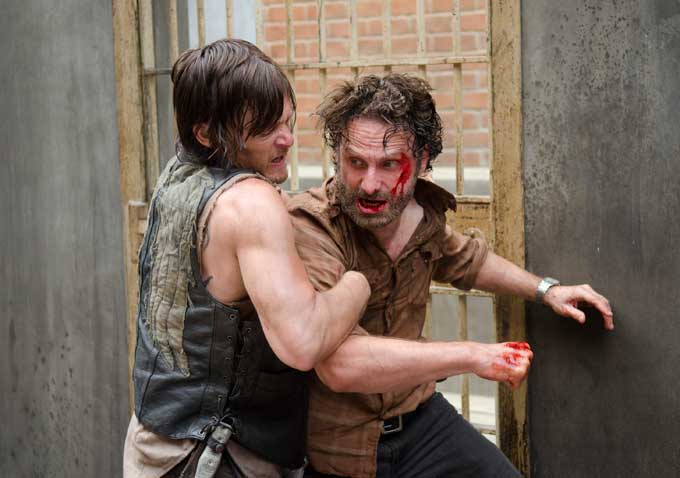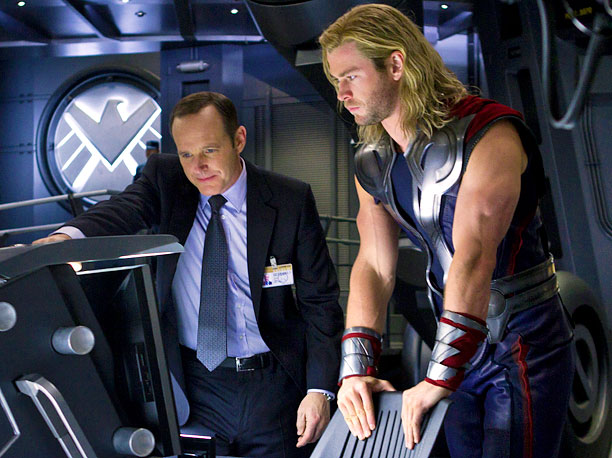By providing your information, you agree to our Terms of Use and our Privacy Policy. We use vendors that may also process your information to help provide our services. This site is protected by reCAPTCHA Enterprise and the Google Privacy Policy and Terms of Service apply.
The 4 Reasons It’s So Hard to Predict TV Plot Twists Today

About six months ago, I started as Head Writer for an iOS app called SHOWoff. It’s best described as fantasy sports for the rest of television. In this ongoing competition, TV fans try to predict what happens next on their favorite dramas, comedies, reality competitions, and live events (like The Oscars). Points are scored on everything you predict accurately, and you can see exactly where you stack up against friends, family, and the world. Fun, right?
Here’s the thing. Everyone thinks they know what will happen next on their favorite TV shows. But, let’s be honest — most of the time they’re wrong. And perhaps you’ve noticed that increasingly, say over the last decade or so, you’ve been wrong more and more often — and not just wrong, but wayyy off base (I’m talking to you, People Who Thought “Lost” Was All Walt’s Dog’s Dream). It’s because TV has changed, and is still changing to this day. What would have played out safe and predictably 20 years ago now can keep people guessing right up until the very last frame before the shocking plot twist. Which of course makes it all the more fun. Which is why we made a game out of it.
So, it’s my job to track storylines (altogether over a hundred shows-worth) and make sure predictions (submitted by writers who are genuine fans of the shows they’re writing about) are fun, make sense, and are in line with what the fans WANT to make predictions on. I also get to see how everything pans out, and who will rise and fall in the rankings on our leaderboards from week to week. I know just how hard it can be. NOBODY ever gets everything right. Here’s why.
Writers Aren’t Dumbing It Down

Back in the day, the general sentiment (though there were exceptions) was that if you wanted the largest possible audience, you had to cast your largest net and write for the masses… and the masses were dumb. What was the point of crafting a complicated story that most people couldn’t (or didn’t want to) keep up with?
As time went on, and data collection on TV viewers became more intricate, networks learned most people aren’t slack-jawed idiots who cower at the slightest sign of an intellectual challenge. In fact, many viewers had a taste FOR such challenges. On top of this, even the least savvy of audience members had wised up to all the old tropes and storylines that were continually being reincarnated with different sets and actors. So the people in charge cut loose of old dispositions, and a new Golden Age of Television was at hand.
Today, characters and storylines are as complex as those from classic literature. Characters don’t sit firmly on either side of the moral fence. Motivation doesn’t have to be explained in exposition-y dialogue. Storylines don’t always have clear climaxes, or pay-offs at all (think The Russian from “The Sopranos”). Viewers are challenged to answer things for themselves by actually putting their brains to work. Many colleges now offer courses on series from “The Wire,” to “The Office,” to “Buffy the Vampire Slayer.” Centuries from now, students may study episodes of “Breaking Bad” like today’s students study Shakespeare.
All this adds up to an unpredictable ride that keeps audiences tuning in every week, and speculating in the time between episodes. And your guess is as good as anyone’s.
The Internet is a Two-Way Street

So TV writers upped their game. But the masses do have one advantage… They outnumber the writers about 185,000 to 1. That’s a lot of brain power. And it’s all connected by this new fandangled thing called THE INTERNET (hint: you’re on it right now). Online fan communities have sprung up around almost every show you can think of, and message board threads discussing theories on how any given show’s plot may unfold can stretch into infinity.
The writers of the shows you are discussing are included in that “all” by the way. And they do read fan theories. Here’s why that’s a problem for predicting what happens — the writers can stumble upon your post, realize the fans have figured it all out, and go back to the writers room to rewrite something less predictable. “Lost” showrunners Damon Lindelof and Carlton Cuse openly admitted to having done this throughout their show’s run. Recently, George R. R. Martin has confessed that some fans on the internet HAVE in fact guessed how his “Song of Ice and Fire” (on which HBO’s mega-hit “Game of Thrones” is based) will play out. Will he change it now to something that will shock EVERYONE? Nobody knows. But what we do know is your predictions are screwed.
Spoilers Are Everywhere

Yes, even in this article. Below be spoilers for “The Walking Dead,” the most popular show on television. I’m serious. You’ve been warned.
Here’s perhaps the greatest hindrance to unsuccessfully predicting a turn — if it happens before you’ve even watched what leads up to it. The ever-rising popularity of DVR and streaming means a lot of TV fans just aren’t watching TV live anymore, and taking it in at your own pace means something is bound to be spoiled for you. You can’t go on Twitter or Facebook on a weeknight without seeing SOMEBODY putting their two cents in about what just transpired on their favorite show. If you live on the west coast like I do and you follow a certain show, you know that you need to apply a hard cut-off on checking your social media exactly three hours before it airs (as it is airing then on the east coast).
In one recent example, fans of AMC’s “The Walking Dead” on the west coast were enraged when the network put up an “RIP Beth” post (I TOLD YOU there was a spoiler here) before the show aired in their time zone. The network had to release an official apology. But the damage had been done. The fact of the matter is, if you’re waiting for a show to go up on Netflix a year after it debuts, you’re at risk of making all your predictions moot, and seriously taking all the fun out of watching and predicting plot points.
TV is Still Evolving

It’s not just the content itself that has changed over the years, it’s the way in which TV’s storytellers present it to us. American audiences are just dipping their toes in the water of some fresh takes on how to tell a story on television. One of which is the anthology show, examples being “American Horror Story,” “Fargo” and “True Detective.” With a new story and a new cast of characters (and mostly new actors) each season, the anthology show has changed the rules of the game. For example, you would never predict a principal character to be killed off five episodes into a new series, but with these one-off tales that wrap everything up in one season, all bets are off.
Another growing trend is the shared universe — and I mean shared between different series, or even feature films. The CW’s “Arrow” and “The Flash” (in its first season now) have already had a few crossovers; characters, even villains, duck out of one series and into the other. You get the sense that the two series are intertwined, enhancing the mythology and expanding possibilities.
An even more mind-bending example is ABC’s “Agents of S.H.I.E.L.D,” of which seasons seem to bridge gaps between Marvel’s theatrical releases (“Iron Man,” “Captain America,” “Thor,” all “The Avengers” — even recently tying into “Guardians of the Galaxy”). Not only do they bridge gaps, but their storylines are affected by the events of those films, and vice-versa. It’s a bigger playground for audiences’ imaginations to wander in. And it’s not just these fantastical comic-book shows that are doing it — this season’s “Chicago Fire,” “Law & Order: SVU” and “Chicago PD” had an epic three-way cross-over in a three episode arc, melding characters from all three shows. Who saw that coming?

And anthology shows and shared universes are only the beginning of making you think about TV plots differently. Other new trends include entire seasons being released at once (“House of Cards” on Netflix, “Transparent” on Amazon, etc), and the movement of half-hour comedies into more serialized storytelling than ever. Even shows meant to be easily digestible are becoming fun to make predictions about — “How I Met Your Mother” comes to mind, where fans spent the entire run of the series trying to figure WHO the mother was. The plotlines of shows like “Veep,” “Silicon Valley” or “Jane the Virgin” could all easily be played dramatically, if they weren’t so damn funny. For comparison, nobody ever felt the intense urge to see what turns next week’s “Happy Days” would bring.
TV has long surpassed its original purpose of selling diapers and cigarettes between predictable, mindless, and unchanging story archetypes. We’ve entered what is collectively referred to as a “golden age” of character exploration, riveting storytelling, and unpredictable plot twists. As tough as it is to to predict what’s going to happen next on your favorite shows, there is always a surefire way to get better at anything: practice. Which is another reason we made SHOWoff — keep tuning in and may spoilers always evade your gaze!
By providing your information, you agree to our Terms of Use and our Privacy Policy. We use vendors that may also process your information to help provide our services. This site is protected by reCAPTCHA Enterprise and the Google Privacy Policy and Terms of Service apply.

















